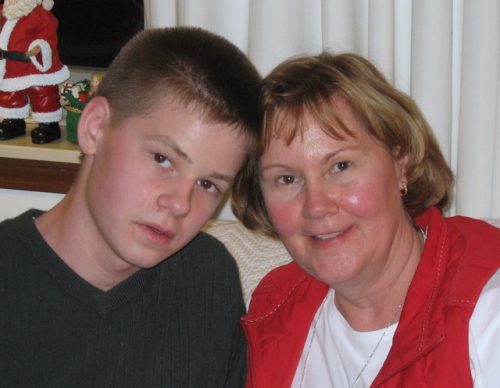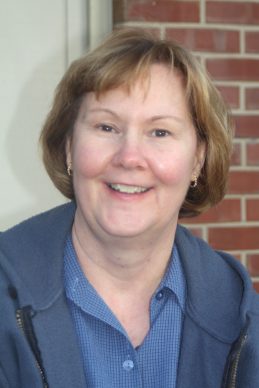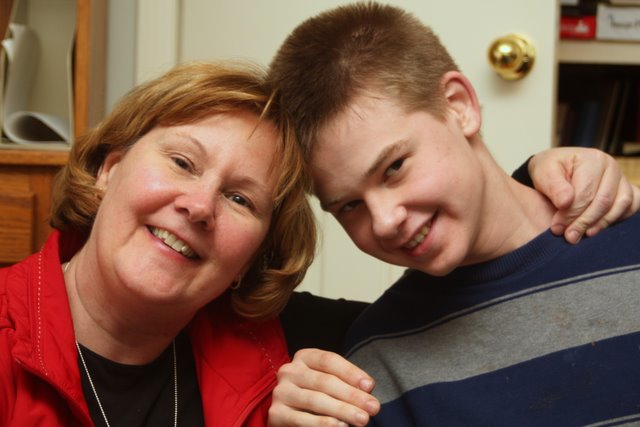At A Glance
Although Nancy McNabb lost a 22-month-old daughter to SIDS, her greatest challenge has been raising her autistic son Stewart. Nancy describes her tireless work with her 19-year-old son, her secrets to staying happily married with a special needs child, the role the gospel has played in her journey, and her work at the University of Illinois in autism education.
What was your religious background growing up?
I grew up in Champaign, Illinois, where my dad was a professor and later the dean of the College of Education at the University of Illinois. My mother’s father was a minister and my father’s mother was a church organist. My family went to the Methodist church for a while, and I remember going to Sunday School one week where the lesson was the Golden Rule. The teacher asked, “Does anybody here know the golden rule and can you recite it?” Nobody raised a hand so I did, and thought, “Well I don’t need this, I already know it!” Then, we went to the Presbyterian church for two weeks, and my mother decided the minister was a bigot, so that was the end of my religious education.
You learned about and investigated the Church while you were in college at the University of Illinois in the early 1970s. What appealed to you about the gospel at that time?
I saw Mormons I admired and like the scripture says, “By their fruits ye shall know them.” The gospel changes you, and I think that attracts a lot of people. Your outlook, your life, your whole world changes. I still feel it to this day: the difference in the way I look at things because of the gospel. It was a gradual change, but I became kinder, more patient, more willing to go outside my boundaries. After my baptism I was walking across campus with a guy in one of my classes, and he said, “There’s something different about you.” I told him I was a member of the Church. I’ve always wondered what happened to him, since he was into transcendental meditation. People look for truth, whether they consciously do it or not. When you grow up in the gospel, you’re taught from the very beginning that this is a good way to be, to try and overcome the natural man. But sometimes it’s foreign to people outside the Church.

Nancy with her husband Paul
What were the circumstances surrounding your daughter’s death?
We had three sons and Emma was our fourth child. She had a syndrome called chondrodysplasia punctata x-linked dominant form and was born with short humerus and femur bones, patchy hair (patchy alopecia), rough skin, and an extra digit on one of her hands. Had she lived, she would have been very little because she had those short bones. Her legs were different lengths, so she would have had to have surgery to lengthen one of her legs and make them the same.
She died when she was 22 months old while the kids and I were down in Lexington, KY, visiting friends for spring break and Paul was home working in Illinois. She had febrile seizures as a baby, which are caused by high fevers, and had to take Phenobarbital. She got a cold and had a seizure at lunch time, so our friend, who was a doctor, brought home some medicine that day. She took the medicine and the next morning I woke up about 5 a.m. kind of chilled. I checked on the children, and when I touched her cheek it was cold. We used to put babies on their stomachs, and I’m guessing that she had a seizure and suffocated. Technically she died of SIDS, because that can happen up to 24 months old. So it wasn’t related to her physical bone condition. Our friend actually ended up signing her death certificate.
How did you discover that your youngest son has autism?
After Emma died I had two miscarriages and then we had Stewart. He seemed perfectly normal until he was about 18 months old. He’d learned his animal sounds and some words and seemed to be developing typically, but then he just stopped saying things. We thought he had a hearing problem because he’d sit on the floor and we’d stand behind him and whisper, “Stewart…STEWART!” and he wouldn’t even turn. That’s very typical of autism. Parents will take their child for a hearing test because they’re not responding. Tests showed his hearing was normal, but he started doing other things. We always kept our dishes in a lower cupboard so the kids could set the table, and he’d take out a bowl and spin it, really spin it. He’d also lick the glass door or get down on his hands and knees and tap his head against the floor. Paul was on a business trip, killing time one evening in a book store, when he picked up a book on autism and read through the checklist. Later we read it together, and we knew that’s what Stewart had. We made an appointment with a pediatric neurologist, but when he observed Stewart, he said he saw autistic behaviors but Stewart seemed too social. Later we found out that it’s just a misconception, especially among older doctors, that autistic kids can’t be social. For being severely autistic, Stewart actually has a pretty good vocabulary, but he just doesn’t have a desire to talk.
One of the things he did when he was young and still does now is called hand leading. An autistic child will take you by the hand and want you to do things for them. Even now, he’s obsessed with fans, and it’ll be time for supper and he has his fan, and I’ll say, “Stewart, turn off your fan,” and he’ll say, “Help me,” even though he doesn’t need help turning it off. I don’t know what the thrill is watching somebody else do it. But I’ll say, “No, you do it.”
What role does the gospel play in helping you cope with these challenges?
My husband Paul and I have talked before and we both think it’s harder to have a child with autism than to have a child die because you get over the death of a child. About six months after a person dies it doesn’t hurt quite so much. Some time passes. But when you’re dealing with something like autism it’s a challenge 24 hours a day for your whole life. Stewart is doing so much better, but when he was little, you just can’t believe how hard it was. He’d do things like take a handful of dirt out of the houseplants and throw it. We had ripening tomatoes on the kitchen counter and he threw them in the family room so there were seeds all over. He threw up on our piano. Paul had to come home from work to take the piano apart to clean it. Stewart used to escape from the house. We would go out to the car and hold onto his hand tightly because he’d pull really hard trying to get away. If he did, he’d start running to the other side of the block. He wasn’t toilet trained totally until he was ten. So dealing with that was a lot harder for us than having a child die. Some might not say that, but one of the reasons we’ve been able to cope with death and disability is because we believe it’s temporary.
The gospel makes all the difference in my life because if you have a testimony of the gospel you can deal with just about anything. When my oldest son was little, we talked about his problems with his feet and that his dad had bad eyes. We talked about the resurrection and how someday we’ll all have perfect bodies, and I believe in it. We’ll see our daughter again and we’ll raise her. That affects everything that I do.
I don’t consider myself special. I have dealt with things because, as far as I’m concerned, you just deal with what you’re given. We were in a meeting a while back and a woman talked about how she wouldn’t be able to handle someone else’s problems, and I said, “Yes, you could.” If it’s your problem, you can deal with it. But people will look at other people with different problems and think, “I’d much rather have mine” because you’re comfortable with your problems. You know you can deal with them because it’s what you do.
How has having Emma and Stewart affected you and the rest of your family?
It makes me a lot more tolerant, more understanding, more humble. We’ve also felt that our kids’ disabilities have made our other children nicer people. They’re just more aware. They’re also very self-sufficient.
How did you balance parenting a handicapped child with the needs of your other children while maintaining your own interests and sense of self?
Paul and I are both happy people. I think there are some genes involved with this. I wake up in the morning and every once in a while I’m tired and don’t want to face the day, but most days I’m excited. I get a rush out of getting things done. It’s also a matter of attitude.
I have felt very lucky to be able to stay home with my kids. Some people consider it a great break to go to work, but I enjoyed being with our kids. Paul was always really good to play with the kids, while I’ve never been very good at that. The other children were also a big help with Stewart, going out to the car and holding on to him or keeping an eye on him.

If I have a good book, it doesn’t matter what else is happening. I’ve always had book group and other things such as teaching piano lessons and singing in the ward choir. Paul takes care of things when I’m gone and I take care of things when he’s gone. I’ve found time to do things I wanted and often mixed it in during daytime. I think you’re being a good role model for your children if you can show them things that you enjoy, instead of showing total self-sacrifice.
What type of educational arrangements did you make for Stewart?
He’s been taught partly at home and partly in public school. We started having teachers come to our house, because the theory is that when autistic children are young, if you repeat teaching things to them they can gradually learn them. There was a woman in our ward who was an elementary education teacher and I asked her if she would be interested in working with Stewart. She was his Annie Sullivan and made a huge difference for him. He also attended school half time in the mornings when he was in grade school, then increased it when he was in 5th grade until right after lunch time. I think if he’d been in public school exclusively, he wouldn’t be functioning as well as he does now because he gets so distracted by groups of people. In grade school, sometimes they’d put up a little divider so he could do his work without as many distractions. The environment at home was so much more peaceful.
Have parenting and caretaking arrangements changed as Stewart transitions from childhood to adulthood?
As Stewart’s gotten older, he’s gotten easier and he also takes medication, which makes a huge difference. Yet we can’t leave him alone. He’d probably do fine, but if the house caught on fire, he’s afraid of fire, and he’d probably go up to his room to get away from it. He wouldn’t know what to do, so in that way it’s like having a toddler. We have some teachers and high school kids we can call to babysit, which is an easy job at our house because he has things to do. But at somebody else’s house he’ll do things like go to the bathroom and turn on the shower or raise and lower their garage door over and over again.
Going away for the night is really hard. We make sure that he has a shower every morning because sometimes parents with special needs kids don’t keep them clean enough. They’re in close contact with other people and my theory is that if your child is clean people will want to be around him. We can’t have a high school girl, or even a high school boy shower him because he’s 19 and an adult male now. So we have a friend who is a respite worker who can come and spend the night and shower him in the morning.
One of Stewart’s challenges is leisure time. He gets bored doing the same old things, but he doesn’t want to do anything new. For instance, if there’s no school, we have to get out at some point during the day. I walk with friends at the church a couple of times a week and will take Stewart with me. He goes around and turns on all the lights in the building and is obsessed with the stake offices door. You always know where to find him at church because he’s always there. I talk to my friends and do my walking and then they help me turn off all the lights and Stewart helps too.

I’ve had a lot of support from friends who can fill in, which helps immensely. We had to attend a funeral recently, so a friend of mine came over and met Stewart’s bus at 3:30 p.m., then his teacher came at four and we were home by five when the teacher left. Another time I cut my finger badly and a friend took over so I could get it taken care of.
Tell me about your work with autism education at the University of Illinois.
I help with one special education class at the University of Illinois where students learn what it’s like to be in a family with a disabled child. Each student is paired up with a family in the area who has a child with a disability. During the course of the semester they spend eight hours with the family, observing the child at school or in the home. I help make those assignments and coordinate panels to come in and speak to the class every week. Sometimes the class has over 50 students and we have to find families for each, which is tricky. Then we have to deal with students who have problems with their families and need to observe someone else. So currently I have two students and I always invite them to come watch Stewart at church. The class is only offered spring and summer so I work four hours a week those semesters and in the fall we find families for special projects classes are doing, if they need to interview someone or assess a child. It’s very part-time, but when I go to class at 3:30 on Thursdays Paul comes home from work.
How have you and your husband kept your relationship strong over the years?
We juggle. Sometimes a special needs child can break a marriage apart, but we feel it’s made ours stronger. You share this common history that no one else really understands. There are a lot of men that don’t deal well with disabilities. They won’t take responsibility or don’t want to recognize that their child is imperfect. But Paul and Stewart are just grand companions. I hardly ever go to the grocery store anymore because they go together and the love it. They stroll through the aisles and have a lovely time. Stewart never wants to go with me, but he always wants to go with Paul. Last weekend there was a miniature train show at one of the local malls and they had the nicest time together. So that makes me happy to see them together.
We tend to take turns going on vacation. Paul goes to a work conference every year, then I’ll leave and go visit kids out of town and he and Stewart will drive out to meet me. Stewart does really well in the car. He could drive 20 hours straight and not bat an eye. It’s hard at the other end when we’re not at home. We have to take stuff for Stewart to do because he starts getting bored. But now we can take Stewart to a movie with us. He doesn’t do terribly well, but it’s something.
At A Glance
Nancy McNabb
 Location: Champaign, Illinois
Location: Champaign, Illinois
Age: 56
Marital status: Married 32 years
Children: Evan (31), Andrew (28), Peter (26), Emma (deceased), Stewart (19)
Occupation: Piano teacher, special ed consultant
Convert? November 11, 1972
Schools Attended: University of Illinois
Languages Spoken at Home: English
Favorite Hymn: “Press Forward, Saints”
Interview by Nollie Haws. Photos used with permission.
At A Glance


